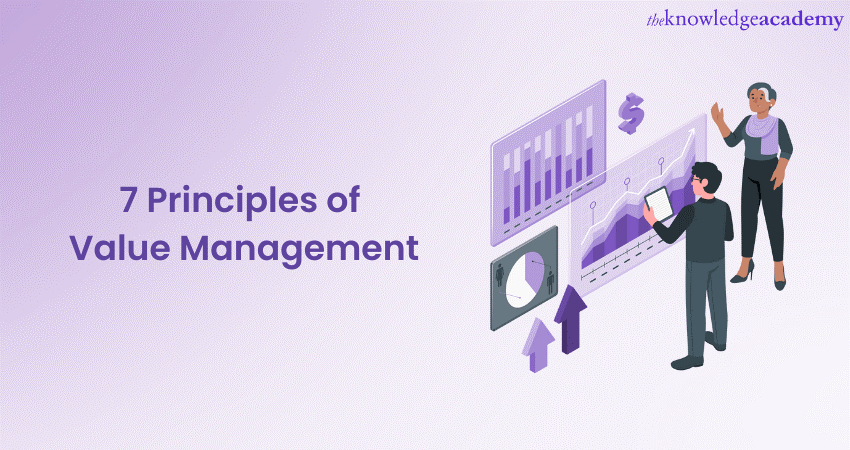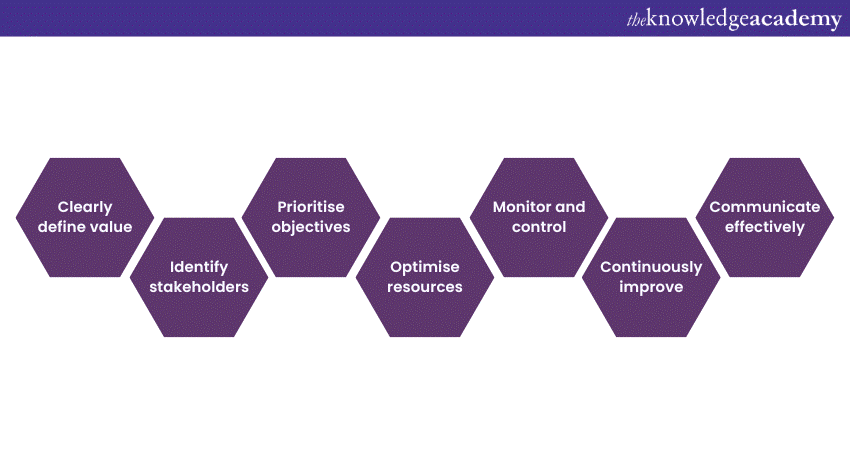We may not have the course you’re looking for. If you enquire or give us a call on +0800 780004 and speak to our training experts, we may still be able to help with your training requirements.
We ensure quality, budget-alignment, and timely delivery by our expert instructors.

In today's competitive business landscape, Value Management plays a crucial role in achieving success. To effectively manage value, it is essential to follow a structured approach that incorporates key principles. This blog will explore the seven Principles of Value Management, providing valuable insights to help businesses optimise their resources and enhance overall performance.
Table of Contents
1) What are the 7 Principles of Value Management?
a) Clearly define value
b) Identify stakeholders
c) Prioritise objectives
d) Optimise resources
e) Monitor and control
f) Continuously improve
g) Communicate effectively
2) Conclusion
What are the 7 Principles of Value Management
This section of the blog will elaborate on the seven Principles of Value Management.

Clearly define value
Clearly defining value is a key principle in Value Management. It involves understanding what value means to different Stakeholders and aligning it with your business goals.
To define it, you must identify the benefits and outcomes your products or services offer. Consider tangible factors like cost savings and quality improvements, as well as intangible aspects like customer experience and brand reputation.
You must guarantee that your value proposition aligns with your organisational objectives. Clearly communicate how your offerings contribute to achieving those goals. Gather insights through market research, customer feedback, and stakeholder engagement to understand their expectations and desired outcomes. Differentiate your proposition from competitors by highlighting your unique strengths.
By following this principle, you can create a clear and compelling proposition that resonates with your target audience.
Unlock your potential in managing successful projects with our MoV Course - Sign up now!
Identify stakeholders
Stakeholders can be best defined as individuals or groups with an interest or influence in your business. They can include customers, employees, suppliers, and regulatory bodies.
By identifying stakeholders, you can understand their needs and perspectives. This helps tailor your strategies to meet their specific requirements and build strong relationships. Conduct stakeholder analysis to prioritise key stakeholders based on their influence and impact. Engage with them through surveys, interviews, and regular Effective Communication to gain insights.
Involving stakeholders fosters collaboration, addresses concerns, and builds trust. Involving stakeholders fosters collaboration, addresses concerns, and builds trust. Remember to identify new stakeholders as your business evolves continuously.
Prioritise objectives
Prioritising objectives is crucial in Value Management. There are steps which help in guiding you through the process of prioritising objectives effectively, and the steps are as follop ws:
a) The Specific, Measurable, Achievable, Relevant, Time-bound (SMART) framework can be used to ensure clear and realistic goals.
b) Align objectives with your business strategy and identify areas for value creation.
c) Evaluate the impact and feasibility of each objective.
d) Involve stakeholders to gain insights and ensure objectives address their needs.
e) Regularly review and adapt objectives to changing conditions.
By prioritising objectives, you allocate resources efficiently and focus on valuable activities. This drives meaningful progress and maximises value.
Optimise resources
Optimising resources is crucial as it involves analysing available resources and identifying areas for improvement.
You can use techniques like cost-benefit analysis and resource levelling to allocate resources efficiently. You can also leverage technology and automation to streamline processes and increase efficiency.
Encourage collaboration and cross-functional teamwork to maximise resource utilisation. Monitor Key Performance Indicators (KPIs) to evaluate resource allocation effectiveness and make necessary adjustments. By optimising resources, businesses achieve cost savings, improve productivity, and enhance value delivery.
Take your project management skills to the next level with our combined MoV Foundation & Practitioner course - Sign up now and become a certified expert!
Monitor and control
Monitoring and controlling involves making sure to track progress using KPIs and making data-driven decisions.
Regularly collect and analyse data to assess performance and identify areas for improvement. Take corrective actions when deviations occur to maintain alignment with business objectives. Businesses ensure effective implementation and ongoing value delivery by monitoring and controlling value management initiatives.
Continuously improve
Continuous improvement includes fostering open communication, seeking feedback, and encouraging innovation. Embrace a culture of learning and experimentation to drive ongoing enhancements. Regularly evaluate processes, products, and services to identify opportunities for improvement. By continuously improving, businesses can adapt to changing needs and deliver increasing value over time.
Communicate effectively
Effective communication is crucial and it involves establishing a clear communication plan, using clear language, and choosing appropriate channels.
Encourage two-way communication, actively listen to stakeholders, and provide timely responses. Update stakeholders regularly, celebrate successes, and be mindful of cultural and language differences. By communicating effectively, businesses foster collaboration, ensure stakeholder engagement, and create a shared understanding of the goals in managing value.

Conclusion
All in all, mastering the Principles of Value Management is essential for businesses to maximise their success. Effectively managing value allows businesses to align offerings with stakeholder expectations, allocate resources efficiently, and drive continuous improvement. This increases customer satisfaction, improves operational efficiency, and sustains success. Additionally, understanding How to add your MoV® Certification to your CV and LinkedIn Profile can help professionals showcase their expertise and enhance career opportunities.
Accelerate your career in project management? Register for our comprehensive MoV Training courses today and gain the skills to excel!
Upcoming Business Skills Resources Batches & Dates
Date
 MoV® Foundation
MoV® Foundation






 Top Rated Course
Top Rated Course


 If you wish to make any changes to your course, please
If you wish to make any changes to your course, please


